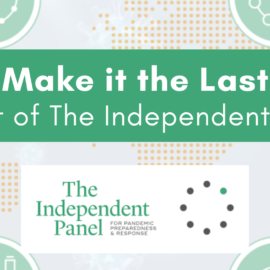
6 Jan 2021

World Federation of Public Health Associations
Advocay Statement on COVID-19 Immunization and Mitigating Vaccine Hesitancy
Preventing millions of deaths annually has been attributed to immunization, and its development is regarded as a significant global health achievement (WHO 2020). Immunization is a critical aspect of primary health care as a fundamental human right to life and health. In the midst of the COVID-19 pandemic, clinicians and scientists have mobilized efforts to accelerate research and vaccine development, a process which typically spans over years (WHO 2020). In only months, more than 100 vaccine candidates have undergone development (WHO 2020). Early phase III clinical trial data of a number of vaccines are promising, and several pharmaceutical companies have reported that their vaccine candidates are both safe and more than 90% efficacious (Nature 2020). At least one vaccine is already being distributed. World Health Organization (WHO) Chief Scientist, Doctor Soumya Swaminathan, has even suggested that further coronavirus vaccine campaigns could begin as early as January 2021 (WHO 2020).
Despite the proven safety and cost-effectiveness of immunization, low vaccination coverage across different socioeconomic settings has remained an ongoing public health challenge (WHO 2008). In 2019, the WHO cited vaccine hesitancy, or the reluctance and refusal to vaccinate despite availability, as one of the top ten global health threats (WHO 2019). The factors contributing to vaccine hesitancy, while complex and context-specific, are often related to the spread of misinformation. During the pandemic, prominent anti-vaccination groups have been lobbying against the use of vaccines to manage COVID-19, with some denying the existence of the virus altogether (Nature Medicine 2020). Moreover, the vaccine development process, which is largely funded through public investment, is poorly understood within the population. Mixed messages from the government and a lack of transparency about the rapid development and deployment of a COVID-19 vaccine has contributed to growing public anxiety, compromising its acceptance (International Journal of Public Health 2020).
Across 19 countries, a survey of 13,426 respondents found that 14% would hesitate or refuse to accept vaccination against COVID-19 (Nature Medicine 2020). Translated onto a global scale, these findings are deeply concerning, suggesting that millions of people may choose not to be immunized. The WFPHA Immunization Taskforce fears that the lack of a coordinated response to growing vaccine hesitancy will further exacerbate the morbidity and mortality rates of the pandemic. In particular, there is concern that the uncontrolled spread of misinformation will disproportionately harm the most at-risk, vulnerable communities. As global COVID-19 immunization begins, health organizations and governments must be equipped to promote trust in the vaccines being distributed and must work alongside healthcare providers who are responsible for delivery.
Therefore, the WFPHA Immunization Taskforce recommends:
- National authorities, NGOs and health organizations should publicly express support for sub-national and/or community-led initiatives that address vaccine hesitancy to help sustain local COVID-19 immunization efforts.
- The international community should acknowledge that life course immunization is a key component of universal health coverage and a necessary preventative measure that can save millions of lives.
- Public health officials and organizations should express their concerns about the lack of investment and infrastructure needed to target public health messages to at-risk populations and recommend investing in public health promotion and literacy as a preventative measure.
- Knowledge translation research efforts be strengthened to enhance communication between public health professionals, policymakers, and the general public with the goal of establishing a common agenda.
- Governments should maintain transparency about vaccine funding and development to ensure that the general public understands howthis intervention best serves public health interests.
References
WHO (2020) The push for a COVID-19 vaccine. (Last accessed: November 2020)
WHO (2020) Coronavirus disease (COVID-19): Vaccine research and development. (Last accessed: November 2020)
Nature (2020) What Pfizer’s landmark COVID vaccine results mean for the pandemic. (Last accessed: November 2020)
WHO (2020) WHO’s Science in 5 on COVID-19 –Vaccines. (Last accessed: November 2020)
WHO (2008) Vaccination greatly reduces disease, disability, death, and inequity worldwide. (Last accessed: November 2020)
WHO (2019) Ten threats to global health in 2019. (Last accessed: November 2020)
Nature Medicine (2020) A global survey of potential acceptance of a COVID-19 vaccine. (Last accessed November 2020)
International Journal of Public Health (2020) When a COVID-19 vaccine is ready, will we all be ready for it? (Last accessed November 2020)


